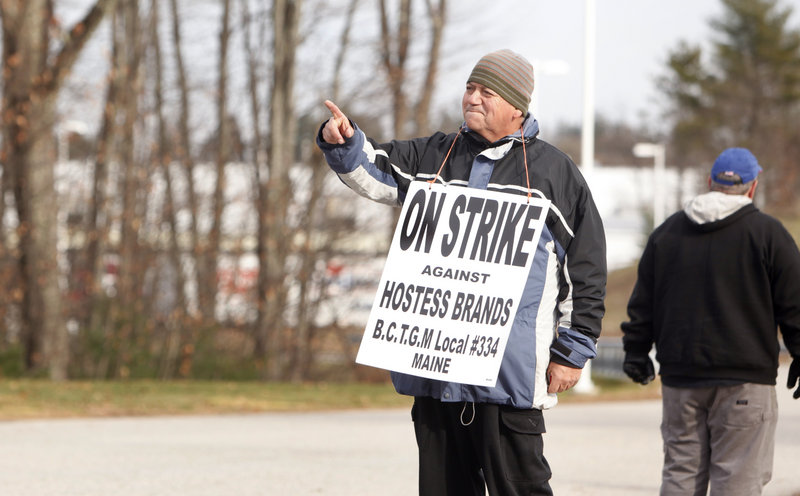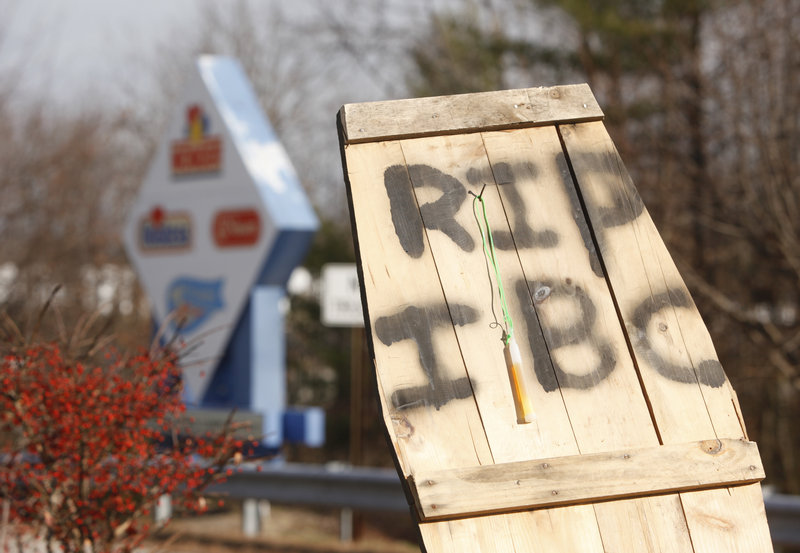Hostess Brands Inc, the bankrupt maker of Twinkies and Wonder Bread, plans to shut its doors after 82 years, selling off its snack foods and bread brands and laying off 18,500 workers in the process.
The move ends a decade of financial tumult for the company that had filed for bankrutpcy twice. By the time Hostess announced its closing Friday, it was more than $1 billion in debt, had seen six CEOs within 10 years, and was facing stiff competition and consolidation in the bakery industry as well as a decline in demand for its products.
The company, however, laid the blame on its bakery workers union, which went on strike Nov. 9.
“We deeply regret the necessity of today’s decision, but we do not have the financial resources to weather an extended nationwide strike,” said Hostess Chief Executive Gregory Rayburn.
Hostess employed 500 workers in Maine, including 370 people in its Biddeford plant.
On Friday, the Irving, Texas-based company was making final deliveries of products made by managers and replacement workers on Thursday night.
Hostess on Friday asked a bankruptcy judge to hold a Nov. 19 hearing to approve its request to close its 33 remaining bakeries and 565 distribution centers. The company closed three bakeries earlier this week and said it would retain some workers to clean the plants and mothball equipment.
Hostess’s top-selling products, once a staple of children’s lunchboxes, include its iconic Twinkies and chocolate cupcakes with the white-icing squiggle, products that saw a drop in sales as health-conscious consumers stopped buying the snacks.
“It’s unfortunate that it had to come this far,” said John Jordan, a business agent for the bakery union’s Local 334.
In September, 92 percent of the bakery union rejected contract concessions that included an immediate 8 percent wage cut. The contract had already been approved by the Teamsters union.
Hostess filed for bankruptcy in January, listing assets of $982 million and liabilities totaling $1.43 billion. Over the past year, the company, which has $2.5 billion in annual sales, had stopped payments to union pension plans, and sought cuts of as much as 32 percent in wages and benefits.
“Hostess’ problems go back almost a decade. The company has clearly been mismanaged for quite some time. However, the workers should not suffer because of poor management,” Teamsters General Secretary-Treasurer Ken Hall said in a statement. “The company’s operating and financial problems were so severe that it required steep concessions from a variety of stakeholders but not all stakeholders were willing to be constructive.”
SunTrust Robinson Humphrey analyst William Chappell Jr. said Flowers Foods Inc. is a likely buyer for some of Hostess’ brands, as is Bimbo Bakeries USA, a division of Mexico-based Grupo Bimbo, or Pepperidge Farm, a division of Campbell Soup Co.
“The Hostess case shows that a strong brand needs a strong organization behind it: labor disputes redirected management attention and in the wake destroyed this brand,” said Boston University School of Management marketing professor Susan Fournier.
Hostess employees still hope a buyer may be found.
“Hopefully other companies will come in and buy the brands and the facilities,” Jordan said. “If not, we’ll be getting our workers retrained and back out in the community. We believe several dozen facilities will be picked up right away. We don’t know about this one, but we’re hopeful and we’ve done our best to present a skilled work force.”
The Biddeford workers plan to will continue picketing over the weekend to ensure that Hostess will actually shut down the facility, and not try to reopen with replacement workers. “We still have a trust issue with the company so we will be out here until we know for sure,” Jordan said.
Rayburn said the impact of the strike makes it too late to save the company even if workers changed their minds. “The strike impacted us in terms of cash flow. The plants were operating well below 50 percent capacity and customers were not getting products,” he said.
Hostess said it was unprofitable under its current cost structure, citing the costs of union wages and pensions. Union workers countered that the company, owned by private equity firm Ripplewood Holdings and several hedge funds that include Silver Point Capital, failed to invest in new technology, marketing and improvement of factories and trucks.
“What’s happening with Hostess Brands is an example of what’s wrong with our economy, as Bain-style Wall Street vultures make themselves rich by making America poor. Crony capitalism and consistently poor management drove Hostess into the ground, but its workers are paying the price,” Maine AFL-CIO President Don Berry said in a statement. “The real story of what is happening in Biddeford is that ‘economics of Bain Capital’ came to Biddeford and now the workers and community are paying the price.”
Staff writer Eric Russell and the Associated Press contributed to this story.
Staff Writer Jessica Hall can be contacted at 791-6316 or at:
jhall@mainetoday.com
Send questions/comments to the editors.








Comments are no longer available on this story